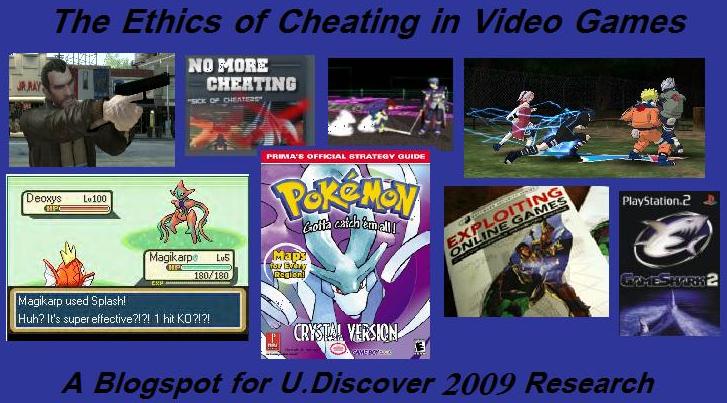Hey everyone, (most likely just the other U.discover people)
My name is Brendan (Bo) Fox Pons and this is the first post of my Ethics of Cheating in Video Games blog for the U.Discover program here at USD. My main issue that I will wish to tackle with my research is the question of whether or not we can classify actions, such as cheating, in video games as ethical or not. Even though today was the first day that we have had a meeting for this program, I have already done a little research on my own and am getting more and more excited about this project as I continually find information. Before anyone accuses me of being an over-achiever, I would like to mention that I will be unfortunately gone for two of the ten weeks that we will be working on U.Discover. I simply had to make up a lot of time before we started.
So far, I have received three books from interlibrary loan and many more are on their way. I have also found numerous articles on GoogleScholar which have been useful up to now. Along with fancy articles to quote in my research paper and poster, these articles have been filled with information and terms of which I have never heard or considered. My original ethical judgement of cheating in video games was that cheating on the personal level was amoral while cheating in multiplayer and interpersonal competitive games would be deemed immoral. While this general thesis has not drastically changed, the terminology which I can phrase this position has changed. I currently hold that due to the effects of the magic circle, a state which one must follow the rules of the game and ignore the conventions of real society, cheating should be, on some level, viewed as transgressive against the integrity of the game and equally as immoral as cheating in real life, but with cheating at merely a personal level, the personal effects of cheating in games and their following ethical judgements cannot not be so easily discerned. I have also learned that ethical complications do not only occur with interpersonal competitions, such as playing Halo 3 or Call of Duty online, but cheating can also effect real-life currency. Games such as Second Life have players buy virtual currency which could then be re-transferred into real currency. When players cheat in these games, not only is one cheating in the game, but that player is also cheating in real life by acquiring money that would not be rightfully theirs. Even though this issue still fits with interpersonal relations, the real-life monetary aspect to games was one that I did not consider and that I was thankful for discovering.
Hopefully, this brief post has been semi-educational and has fostered some interest in my research,
B. F. Pons
Subscribe to:
Post Comments (Atom)


No comments:
Post a Comment